Coffee and Cream Pavlova Recipe
Coffee pavlova: a lush, billowy meringue infused with coffee, filled with coffee cream and embellished with fresh berries. Perfect for any occasion.
Whether pavlova has its origins in New Zealand or Australia is a topic of ongoing debate. What is known, is that the dessert was named after Russian ballerina Anna Pavlova in the early 1900s. Today, it has spread far beyond the Australian continent.
A traditional pavlova comprises a layer of marshmallowy meringue and whipped cream. It is then piled high with vibrant, fresh fruit.
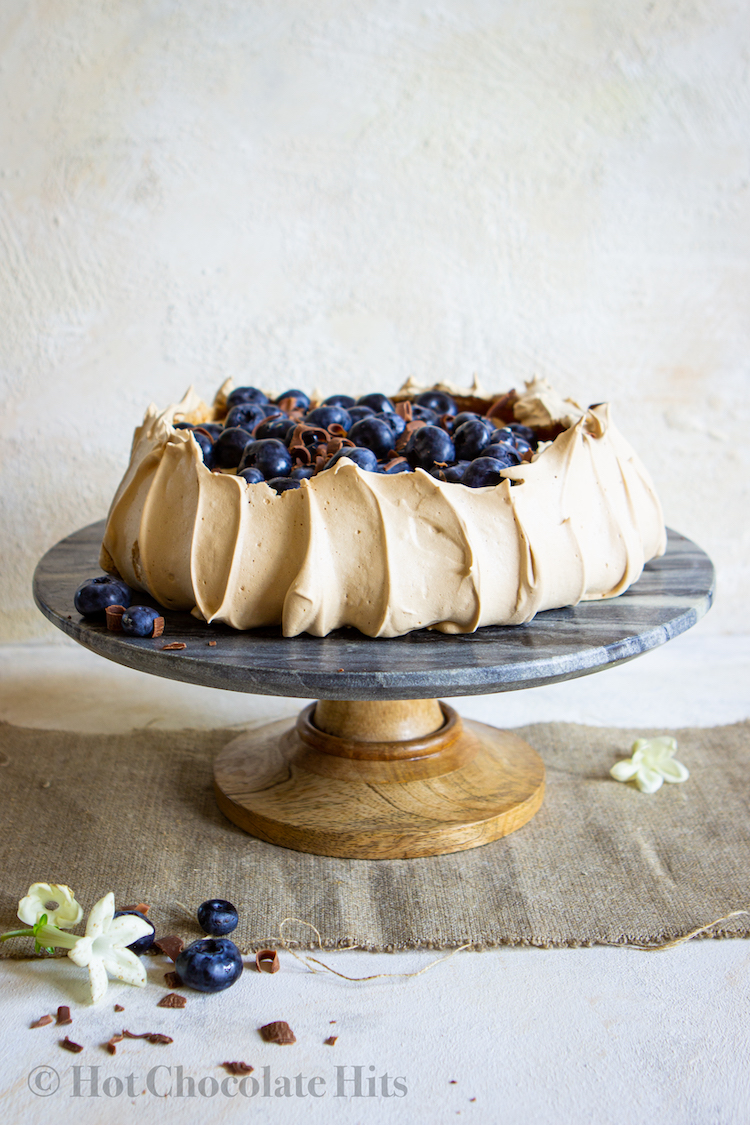
Calling all coffee lovers
This coffee pavlova recipe is a step away from the classic, spiked with coffee for a slightly more complex flavour, that cuts through the sweetness of the meringue.
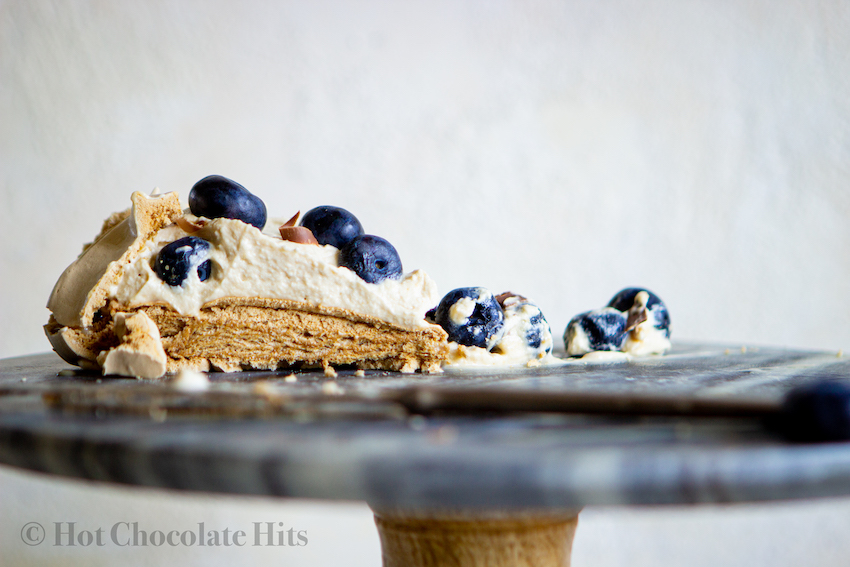
The cream layer is slightly richer and denser than a traditional whipped cream, thanks to the addition of mascarpone cheese, which yields a texture somewhere between a chocolate mousse and cheesecake. In fact, the cream could be enjoyed as a ‘coffee’ mousse of sorts.
Finally, this coffee pavlova recipe may be finished with the fruit of your choice. I leave this part up to you: I tend to lean towards berries, which lend a slight tartness, but bananas could also be a delicious alternative. A few chocolate curls finish this dessert off beautifully.
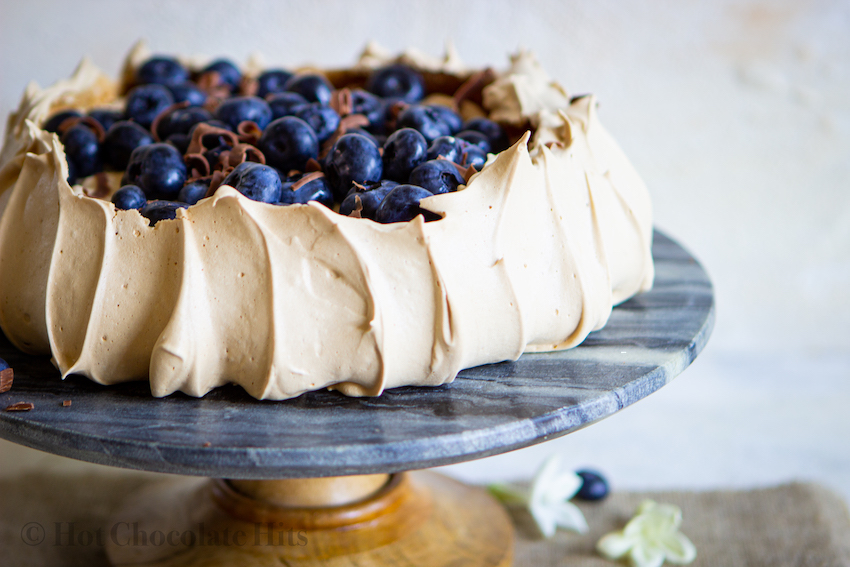
Some tips for you:
- To ensure that the egg whites whip properly, you can crack them a day in advance and keep in an airtight container. Make sure you are using a clean glass bowl to whip, and make sure there are no traces of the yolk.
- Use an electric mixer– it speeds things up significantly.
- The vinegar and cornstarch help stabilise the egg whites.
And lastly, enjoy!
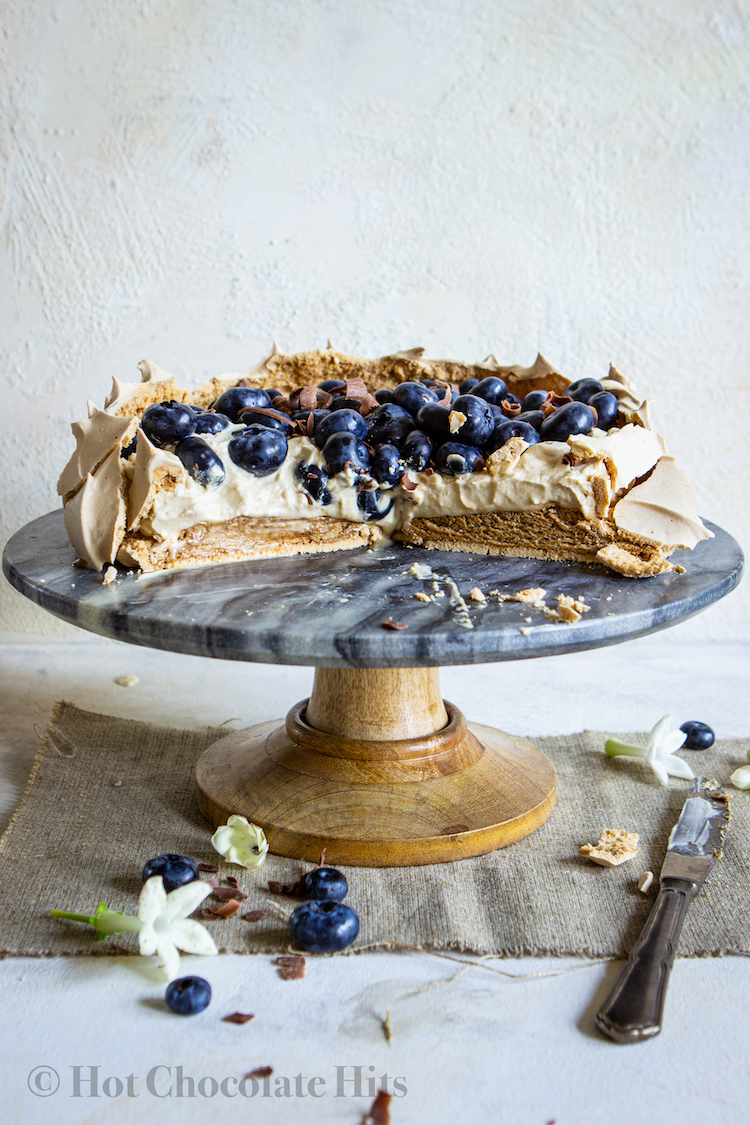
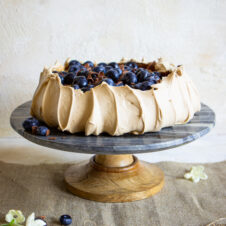
Coffee and Cream Pavlova
Ingredients
For the coffee meringue:
- 3 large egg whites
- 150 grams granulated sugar
- 2 tsp cornstarch
- 1 tsp vinegar, plain or apple cider
- 1 tbsp (3 tsp) instant espresso powder
- 1 pinch salt
For the coffee cream:
- 250 g (9 oz) mascarpone cheese
- 250 mL (1 cup) heavy whipping cream, chilled
- 1 tsp vanilla extract
- 1 tsp instant espresso powder
- 2 tbsp granulated sugar
To serve:
- Fresh fruit, such as berries
- chocolate curls
Instructions
- Begin by preheating the oven to 180 C (350 F) and line a baking tray with parchment paper. I also like to draw a 22(9 inch) circle on the parchment, which acts as a guide when shaping the meringue.
- Next, if you haven't already, separate the egg yolks from the whites. I like to do this using two bowls, one for the yolks and one for the whites. Crack the egg, then move the yolk back and forth between the shell to release the whites. Make sure there are no traces of the yolk in the whites, as that may affect how well the whites whip.
- Transfer the egg whites to a large, clean glass bowl, and whip them using an electric beater till you’re left with a thick, foamy mass. The eggs should be stiff, so if you turn the bowl over, the shouldn't move or fall out.
- Gradually trickle in the sugar, one or two tablespoons at a time, beating well after each addition, it will take around 10 minutes in total. The mixture will be glossy, stiff and smooth. If you rub it between your fingers, you shouldn’t feel any sugar granules.
- At that stage, add in the cornstarch and vinegar (which help stabilise the whites and prevent them from deflating), as well as the espresso powder and salt.
- Scrape down the sides of the bowl while whipping to make sure everything is well-incorporated.
- Scoop the mixture and spoon onto the prepared parchment tray, forming it into a 22 cm (9 inch circle). Use an offset spatula or knife to spread the mixture out, and make sure to flatten the top. I also like to use the back of a spoon, dragging it up vertically around the mass to create an indented pattern (see video).
- Reduce the oven temperature to 150 C (300 F) and place the pavlova on the middle rack of the oven. I also like to add an empty tray on the top rack, as I find that it helps even the baking. Bake the pavlova for one hour, or until it has puffed slightly.
- Turn off the oven, and let the pavlova cool completely with the oven door left slightly ajar. It will likely take around two hours to cool completely. In the meantime, prepare the coffee cream.
For the coffee cream:
- Place the cream, mascarpone cheese, espresso powder, granulated sugar and vanilla extract into a large bowl, and whip using an electric mixer (or whisk!) until there are no lumps, and the mixture forms peaks when you lift the beaters. Keep the cream mixture chilled until you are ready to serve.
To assemble:
- Gently peel back the parchment paper from the pavlova, and place the base on a cake stand or serving plate.
- Pile with the cream, spreading it as evenly as possible, and top with the fresh fruit and chocolate curls, if using.
- Serve immediately after topping with the cream and fruit.
Video
Notes
Like this coffee pavlova recipe? Here are more coffee-flavored recipes!


I made your coffee pavlova last night for Labor Day and followed your instructions to a T. Loved it!
Im not super into too sweet desserts so it was a good balance but definitely needed the fruit to enhance it.
I did notice the ingredient list and instructions have zero sugar in the whipped cream and I thought strange but the pavlova must be pretty sweet to eliminate it and continued on anyway as Ive made whipped cream before but this was my first ever pavlova. Then I watched your youtube video today and realized there was 2 Tbsp of sugar mentioned there. Just wanted to contact you to let you know of the difference of information.
Thank you for sharing your recipe as it is now going to be one I make for my lived ones again and again!
Thanks! Will make sure to update that:)